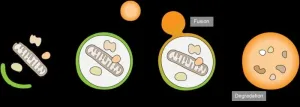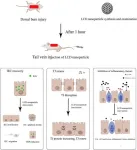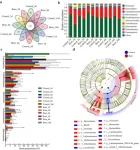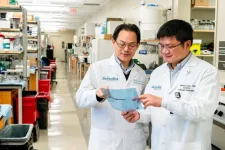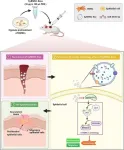(Press-News.org) It’s no secret that smoking is extremely detrimental to health. Tobacco smoke contains thousands of chemicals, including carcinogens, increasing the risk of cancer, cardiovascular and respiratory diseases.
A new study from the University of Chicago analyzed data from more than 900 samples of nine different human tissue types to understand just how deep the cellular and genetic damage from smoking goes. The research team generated epigenetic data to assess the effects of smoking on DNA methylation, or genetic locations where a handful of atoms can attach to DNA and turn off gene expression. They found several new regions associated with smoking, including some that are shared across tissue types, suggesting that DNA methylation is part of the body’s attempts to defend itself from the damaging effects of tobacco smoke.
The paper, “The association of cigarette smoking with DNA methylation and gene expression in human tissue samples,” was published March 14, 2024, in the American Journal of Human Genetics.
Exposures affect more than the blood
Epidemiological studies on the effects of exposure to chemicals and other environmental contaminants like smoke often use only blood samples, mostly because they are easy to collect. For this new study, senior author Brandon Pierce, PhD, Professor of Public Health Sciences and Human Genetics at UChicago, and his team worked with samples from the GTEx Project, a publicly funded biobank housing human tissue samples from more than 950 postmortem tissue donors. The team used DNA methylation data from nine tissue types, including lung, colon, ovary, prostate, whole blood, breast, testis, kidney, and muscle.
“If we want to understand the effects of environmental exposures like smoking, it's important to study a variety of tissue types, in addition to blood, because disease occurs in many different organs in the body,” Pierce said. “The epigenome varies dramatically across cell types and tissue types, as could the epigenetic effects of exposures.”
The tissue samples also came with data about whether the donor ever smoked in their lifetime (i.e. “ever smokers”), if they never smoked (never smokers), or they were currently smoking at the time of death (current smokers). The team analyzed data on DNA methylation at cytosine-guanine (CpG) dinucleotides, or regions of DNA where a cytosine nucleotide is followed by a guanine nucleotide in the sequence of bases. They found 6,350 smoking associated CpGs in lung tissues, and 2,753 in colon tissues, meaning that these genetic regions showed differences in DNA methylation among the ever or current smokers, compared to never smokers.
Doing this same kind of analysis in blood samples only reflects the effects of smoking on immune cells, whereas analyses in non-blood tissues gives researchers a new window into its health impacts. “When we do our multi-tissue study, it gives a way more comprehensive understanding of how smoking affects the human body,” said James Li, the study’s co-first author and an MD/PhD student in the Department of Public Health Sciences. “I think our work is super exciting because we had the power to directly examine the effects of smoking in tissues such as lung and colon, which are highly relevant in the pathophysiology of smoking.”
Understanding defense mechanisms to smoke
Many of the CpGs identified in the tissues matched up with ones identified in previous studies using blood samples, including genes involved in detoxification or transformation of foreign chemicals so they can be removed from the body. There were big differences among tissue types too, however. The lungs have nearly three times as many smoking-associated CpGs identified as the colon, for example, which makes sense because the lungs are directly exposed to cigarette smoke.
“Each tissue is exposed to smoking in a different way. The lung is much more direct through inhalation, whereas the colon comes later. So, that's a different nature of exposure, and we can capture the effects of that difference,” said Niyati Jain, co-first author and a PhD student in the Committee on Genetics, Genomics, and Systems Biology.
While we certainly don’t need more evidence that smoking is bad for health, this tissue-specific understanding of its effects does help understand what’s happening at a cellular level, and how the body responds to exposure. “The epigenetic responses to smoking may reflect mechanisms that defend us against or mediate the adverse effects of smoking. Characterizing them can give us a better understanding of disease relevance and risk,” Jain said.
In addition to smoking, Pierce said he can envision using the same technique to understand other, less obvious, environmental exposures. “We can identify epigenetic signatures that can serve as biomarkers of exposure effects. For example, based on a person’s epigenome, we can potentially tell if they’ve been exposed to a particular type of contaminant,” he said. “The more we can increase the diversity of tissues and number of samples from more people, the more we can learn.”
The study, “The association of cigarette smoking with DNA methylation and gene expression in human tissue samples,” was supported by the National Institutes of Health (grants U01 HG007601, R35 ES028379, R01 GM108711, and U24 CA210993). Additional authors include Lizeth I. Tamayo, Lin Tong, Farzana Jasmine, Muhammad G. Kibriya, and Lin S. Chen from the University of Chicago; Kathryn Demanelis from the University of Pittsburgh; and Meritxell Oliva from AbbVie.
END
Tissue samples show the deep genetic and cellular impacts of smoking
UChicago researchers measure DNA methylation in tissue samples from former smokers and find evidence of the body’s defense mechanisms against environmental exposures.
2024-03-14
ELSE PRESS RELEASES FROM THIS DATE:
SickKids program provides integrated, trauma-informed care for pregnant and parenting adolescents
2024-03-14
The pregnancy and post-partum experience is stressful, but for pregnant adolescents the barriers to accessing supportive care can have fatal consequences.
A recent study from The Hospital for Sick Children (SickKids) identified that compared with those who had no teen pregnancy, teenagers in Ontario who experienced a pregnancy were at a 50 per cent higher risk of premature death before the age of 31. This risk was even higher for people who had two or more teen pregnancies and amongst those who were pregnant before 16 years of age.
Published in JAMA Network Open, the study also found that ...
Even cells know the importance of recycling
2024-03-14
Researchers from Tokyo Medical and Dental University (TMDU) uncover the specific protein interactions needed for cells to break down and remove damaged mitochondria
Tokyo, Japan – Autophagy is a process used by cells as a recycling system to transport and break down organelles and other cytosolic components, which become enveloped in a membrane called the autophagosome (Fig 1). When this involves the removal of damaged mitochondria, commonly called the “powerhouse” of the cell, it is known as mitophagy. In a recent article ...
Political theorist Achille Mbembe named 2024 Holberg Prize Laureate
2024-03-14
Achille Mbembe is research professor of history and politics at the Wits Institute for Social and Economic Research, at the University of the Witwatersrand, Johannesburg. He will receive the award of NOK 6,000,000 (approx. EUR 525,000) during a 6 June ceremony at the University of Bergen, Norway.
Mbembe is one of the most read and cited scholars from the African continent and receives the prize for his pioneering research in African history, postcolonial studies, humanities, and social science over four decades. ...
Revolutionary nanoparticle therapy offers new hope for burn victims
2024-03-14
A research has developed a new nanoparticle treatment that significantly improves outcomes for severe burn-induced intestinal barrier disruption. The study introduces Luminol-conjugated cyclodextrin (LCD) nanoparticles, offering a promising therapeutic intervention for one of the most critical complications following severe burn injuries.
Severe burns can cause critical issues, including deep tissue damage and increased risk of fatal conditions like sepsis and organ failure. A major concern is the disruption of the intestinal barrier, leading to inflammation and systemic ...
New study unveiled burn injury disrupts gut microbiome and weakens intestinal mucus barrier
2024-03-14
The gut microbiota, a complex ecosystem within the human intestinal tract, is increasingly recognized for its vital role in human health and disease. Notably, its relationship with intestinal damage due to burns has been underexplored. New study has unveiled the pivotal role of gut microbiota in the synthesis and degradation of intestinal mucus following burn injuries in mice. Utilizing advanced 16S rRNA and metagenomic sequencing techniques, researchers have identified significant changes in gut microbiota composition and its impact on the intestinal mucus barrier.
On a study ...
Researchers may have found key to deprogram cells that lead to transplant rejection
2024-03-14
HOUSTON-(Mar. 14, 2024) – Houston Methodist researchers identified a troublesome subset of T-cells in transplant recipients that may be a more effective therapeutic target for preventing transplant rejection in patients.
Each day, 17 people die waiting for organ transplants, but getting a new organ doesn’t guarantee survival. Despite immunosuppressive medications, rejection of transplanted organs happens in up to 50% of patients, depending on the type of organ transplanted and the duration since the transplantation.
Wenhao Chen, Ph.D., associate professor of transplant immunology with the Houston Methodist Research ...
Healing diabetes wounds with a new superhero: stem cell magic
2024-03-14
Researchers unveiled a novel therapy for diabetic wound healing. This research highlights the use of exosomal miR-4645-5p from hypoxic bone marrow mesenchymal stem cells (BMSCs) to significantly enhance wound healing by promoting keratinocyte autophagy.
Diabetic wounds, often challenging to treat and prone to complications, can severely impact patients' quality of life. Traditional treatments have struggled with issues like low survival rates of transplanted cells and potential for immune rejection. This research introduces a groundbreaking approach using stem cells' regenerative capabilities.
On ...
New AI model detects ninety percent of lymphatic cancer cases
2024-03-14
Medical image analysis using AI has developed rapidly in recent years. Now, one of the largest studies to date has been carried out using AI-assisted image analysis of lymphoma, cancer of the lymphatic system. Researchers at Chalmers University of Technology in Sweden, have developed a computer model that can successfully find signs of lymph node cancer in 90 percent of cases.
New computer-aided methods for interpreting medical images are being developed for various medical conditions. They can reduce the workload for radiologists, by giving a second opinion or ranking which patients need treatment the fastest.
"An AI-based computer system for interpreting medical images ...
Bariatric surgery linked to heart health improvements in people with severe obesity
2024-03-14
WASHINGTON—Bariatric surgery may result in significant cardiometabolic improvements, particularly among younger, female, or white people and those without comorbidities, according to new research published in the Journal of the Endocrine Society.
The United States has the highest obesity rates globally. In 2017-2018, about 40% of U.S. adults had obesity and 9% had severe obesity. The prevalence is particularly high among Black adults. Bariatric surgery is one method to help people with severe obesity lose a lot of weight and improve their health.
“Our study highlights how bariatric surgery not only leads to significant weight loss but also substantially improves ...
New report finds public spending on global health innovation delivers blockbuster returns, saving lives while generating billions of dollars in benefits globally and domestically
2024-03-14
WASHINGTON, DC (March 14, 2024)—Over the last 16 years, U.S. government funding for research and development (R&D) targeting global health challenges supported dozens of breakthrough innovations while generating billions of dollars in economic benefits, both global and domestic, and spurring a surge of industry investments, according to a new analysis from the Global Health Technologies Coalition (GHTC) and Policy Cures Research (PCR).
“Public funding for global health R&D is small, relative to the incredible returns it provides for fighting neglected ...
LAST 30 PRESS RELEASES:
$3 million NIH grant funds national study of Medicare Advantage’s benefit expansion into social supports
Amplified Sciences achieves CAP accreditation for cutting-edge diagnostic lab
Fred Hutch announces 12 recipients of the annual Harold M. Weintraub Graduate Student Award
Native forest litter helps rebuild soil life in post-mining landscapes
Mountain soils in arid regions may emit more greenhouse gas as climate shifts, new study finds
Pairing biochar with other soil amendments could unlock stronger gains in soil health
Why do we get a skip in our step when we’re happy? Thank dopamine
UC Irvine scientists uncover cellular mechanism behind muscle repair
Platform to map living brain noninvasively takes next big step
Stress-testing the Cascadia Subduction Zone reveals variability that could impact how earthquakes spread
We may be underestimating the true carbon cost of northern wildfires
Blood test predicts which bladder cancer patients may safely skip surgery
Kennesaw State's Vijay Anand honored as National Academy of Inventors Senior Member
Recovery from whaling reveals the role of age in Humpback reproduction
Can the canny tick help prevent disease like MS and cancer?
Newcomer children show lower rates of emergency department use for non‑urgent conditions, study finds
Cognitive and neuropsychiatric function in former American football players
From trash to climate tech: rubber gloves find new life as carbon capturers materials
A step towards needed treatments for hantaviruses in new molecular map
Boys are more motivated, while girls are more compassionate?
Study identifies opposing roles for IL6 and IL6R in long-term mortality
AI accurately spots medical disorder from privacy-conscious hand images
Transient Pauli blocking for broadband ultrafast optical switching
Political polarization can spur CO2 emissions, stymie climate action
Researchers develop new strategy for improving inverted perovskite solar cells
Yes! The role of YAP and CTGF as potential therapeutic targets for preventing severe liver disease
Pancreatic cancer may begin hiding from the immune system earlier than we thought
Robotic wing inspired by nature delivers leap in underwater stability
A clinical reveals that aniridia causes a progressive loss of corneal sensitivity
Fossil amber reveals the secret lives of Cretaceous ants
[Press-News.org] Tissue samples show the deep genetic and cellular impacts of smokingUChicago researchers measure DNA methylation in tissue samples from former smokers and find evidence of the body’s defense mechanisms against environmental exposures.
